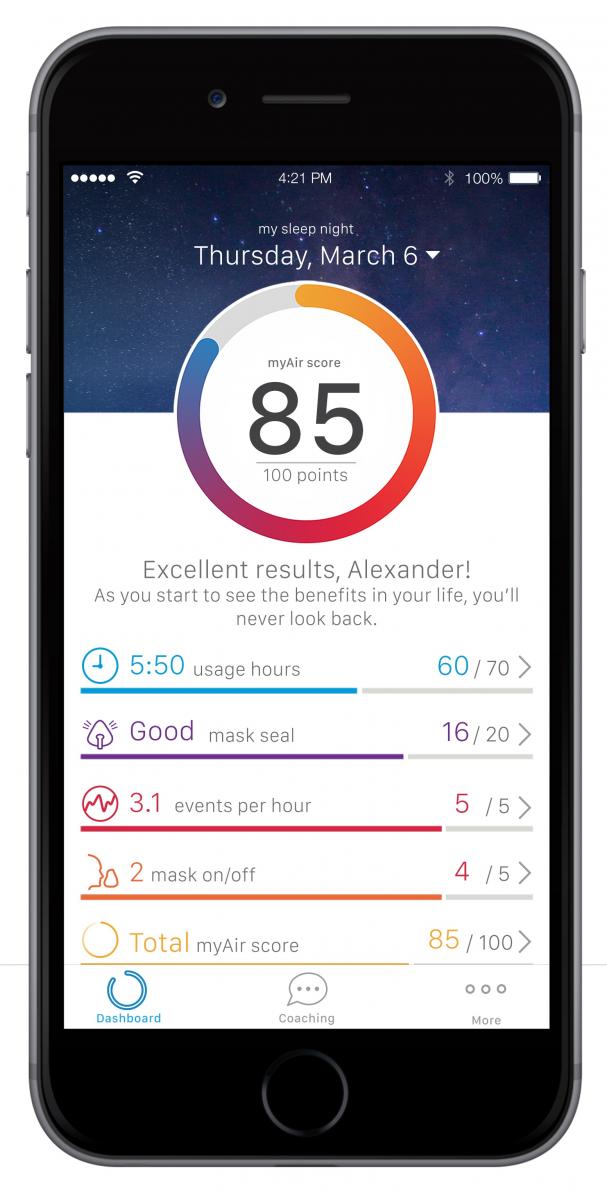 San Diego, California-based ResMed, maker of connected respiratory devices, announced strong results for its quarter ending on December 31, with over $530 million in revenue representing a 17 percent increase year over year.
San Diego, California-based ResMed, maker of connected respiratory devices, announced strong results for its quarter ending on December 31, with over $530 million in revenue representing a 17 percent increase year over year.
On a call with investors, ResMed CEO Mick Farrell said the growth was driven by sales from Brightree – the cloud-based software company ResMed acquired last year for $800 million – and sales from a number of new devices, including the AirFit range of masks that were launched midway through the quarter. (Excluding the increases associated with the Brightree acquisition, ResMed’s total revenue for the quarter was $496.6 million).
“We achieved solid, double-digit, global revenue growth,” Farrell said on the call. “The number of patients managed on the AirSolutions platform and the number of daily users of our Brightree platform continue to grow rapidly.”
Gross margin for the quarter was 58.3 percent, just a bit higher than the prior year’s quarter gross margin of 58.1 percent. Net income was $76.7 million, which is down 20 percent from the previous year’s same quarter. Income from operations was $96.9 million, representing a 10 percent decline year over year, which was attributed to an 18 percent increase in selling, general and administrative expenses and a 32 percent increase in research and development expenses.
While Farrell spoke of global growth, particularly the maturation of their ResMed China business, most of the gains were right here in America. The company saw a 13 percent growth in all devices. But, with all that growth came some pain: ResMed had some difficulties keeping up with demand.
“The patient and providers and clinician acceptance in the mask has been great,” Farrell said, adding that company expects to catch up by the third quarter and be ahead of demand by Q4.“The infinity seal technology, particularly, and its ability to reach 97 percent to 99 percent of the patients that are coming to a sleep lab or through a clinic, and so the acceptance has been great and certainly exceeding what we had thought it may be.”
Robert Douglas, ResMed’s Chief Operating Officer added that keeping up with demand globally wasn’t so much a problem as it was domestically.
“The volumes in the US are much larger elsewhere in the world and we really don’t see a big impact on the rest of the world rollout,” he said on the call. “That will continue slow and steady progress.”
With those big gains associated with growing demand and a robust product development pipeline, investors wondered whether ResMed could continue at a clip that is sustainable. Farrell said it was possible, as the company expects the lower costs home care providers experience when they set up therapies with the cloud-based AirView and myAir monitoring tools.
“So we did have very strong growth devices in the Americas, it’s 13 percent on a constant currency basis,” Farrell said. “The value proposition of AirSolutions has shown itself to be very sustainable. It's a sustainable compelling value proposition for customers. When you're reducing the costs of therapy setup by 50 percent or 60 percent, it's becomes embedded into the work flow and just how our home care provider partners like to work, they like to work with the cloud-based system. They like to work with one that's lower costs and drives adherence.”
ResMed also received FDA clearance for their small, portable CPAP device earlier this month, which they announced during the JP Morgan conference in San Francisco. They also announced SleepScore Labs, their joint venture with Dr. Mehmet Oz and Pegasus Capital Advisors that aims to compile and analyze consumer sleep data using the company’s sleep monitoring technology S+, which consists of a non-contact bedside sleep monitor and companion app.
Farrell also pointed to a growing user base of ResMed’s provider-facing monitoring tool, Airview, and new research showing the use of the myAir app to improve CPAP therapy adherence.
“This quarter, we announced we have reached a milestone with more than a billion nights of sleep data in our cloud-based physician and provider solution called AirView,” he said. “We have well over 2 million, 100 percent cloud-connected medical devices. We are liberating data and unlocking value for physicians, providers and patients like never before.



















